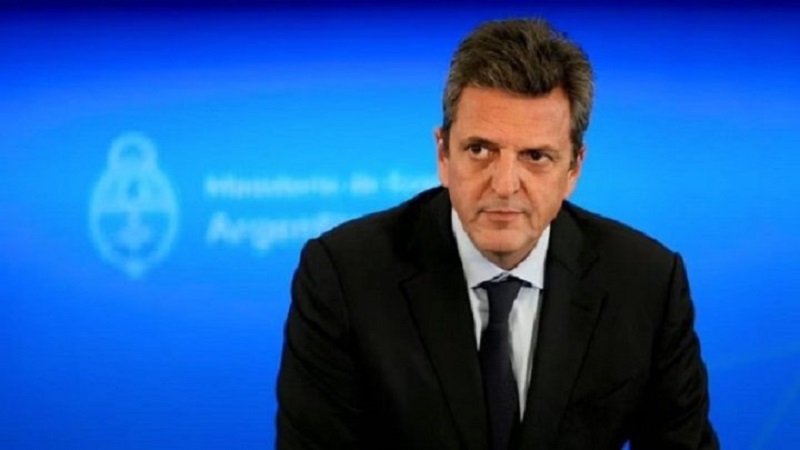
“It was on August 3 when Massa agreed to the highest step he could aspire to under the Frente de Todos scheme. (…) Ambitious, bold and calculating, Massa had among his merits that of having sat down to watch Fernández bleed to death, while he resisted without method or cunning to give up what was left of his power. He now assumed a role that exceeded that of the prime minister and resembled that of a full-function controller who started, at the same time, with the support of economic power and the Senate ”, describes the journalist Diego Genoud at the beginning of the book “El arribista del poder. The non-advertising story of Massa” which recounts Massa’s negotiation within the government coalition until he occupied the office on the fifth floor of the Ministry of Economy as super-minister (he also absorbed the portfolios of Productive Development and Agriculture and Livestock and Fisheries) after the resignation by Martín Guzmán, and the fleeting step of Silvina Batakis.
Little remains of the enthusiasm at the party that the Renewal Front prepared on the day of Massa’s inauguration with the presence of big businessmen, governors, union leaders, and even Moria Casán after ten months in office at the Ministry of Economy. The ambition of the former president of the Chamber of Deputies was to risk “raising the boat” that would position him as the ruling party’s presidential candidate. Massa’s plan was frustrated, the promise to reduce inflation and the exchange rate gap was not fulfilled. The rise in prices in May, according to the consultants, will be around between 8% and 9%, the lack of dollars and the exchange pressures that will come (as the elections approach) force the Frente de Todos to recalculate and let the candidacy run presidential of Edward “Wado” of Peterwho is the third generation of agricultural entrepreneur.
Adjustment and award to agricultural employers
Los first announcements of Minister Massa aimed to deepen the adjustment, to apply the tariffs in public services and to seek dollars to strengthen the reserves of the Central Bank. This plan continues this year, the cuts in retirement, Universal Child Allowance, and subsidies deepened. The objective is to comply with the agreement with the IMF.
Massa implemented several measures in favor of the owners of the country, such as the well-known “soybean” dollar so that those who already have a lot can earn more. Thus, there were three versions of the soybean dollar, and in the latter it was extended to other products besides soybeans such as sunflower, sorghum and barley and to regional economies. These measures mean a million-dollar transfer from the State to agricultural employers.
In November of last year, the “super minister” announced the Fair Prices program. But it was too late because in December inflation picked up momentum again, jumping to 5.1% and ending 2022 at 94.8%. The consequence was a further deterioration in wages. This year prices accelerated, in April inflation climbed to 8.4%the heading of food and beverages exceeded double digits: 10.1%. An increase that hits hard the poorest sectors that allocate a greater part of their income to the purchase of food. Informal workers are the ones who have lost the most purchasing power in recent years, in March it fell 19.6% compared to December 2019.
After questioning the policies of former minister Martín Guzmán, Kirchnerism supports Massa’s management without criticism despite the progress of the adjustment to comply with the Fund, the economic and social deterioration.
Are the dollars enough?
The net reserves of the Central Bank are low, some specialists affirm that they are negative. Massa’s trip to China and the desperate negotiation with the IMF to advance disbursements for the year seek to shore up reserves. The unknown is whether the dollars will be enough or if the government will devalue.
In the electoral periods, capital flight accelerates because the “markets” become dollarized. According to data from the Central Bank, the formation of external assets of the non-financial private sector (capital flight) in 2011 was US$ 22 billion, in 2015 US$ 8.5 billion, and in 2019 US$ 27 billion. In the first quarter of 2023, the flight was US$ 494 million, the lower figure is due to exchange restrictions. Despite the limitations to access the official dollar, it is probable that there will be greater exchange pressures in the parallel markets. For this reason, the minister seeks dollars to intervene in the exchange market and reduce the exchange rate gap.
The agricultural dollar for soybeans and other products ended in May. According to data from the Ciara Cec business chamber, that month companies in the sector liquidated US$ 4,212 million. In May the liquidation was higher than in December, when there was another version of the soybean dollar when the grain companies liquidated US$ 3,707 million, but it was lower than in September, which was the first soybean dollar. The consulting firm Ecolatina, as detailed by Diego Genoud in La Política Online, estimated that of the dollars settled for the agricultural dollar, the Central Bank was able to retain 28%, while in previous editions it was able to keep 65% and 75%.
For her part, the china tour He left investment projects and advance payment promises for investments in energy, the Santa Cruz dams, a treatment plant in Laferrere. The extractivist agenda was also present, the minister held meetings with mining companies dedicated to the lithium business. Meanwhile, Dilma Rousseff, president of the New Development Bank of the Brics, told Massa that Argentina would enter the bank in August and could then have funds. But August is an eternity for the minister’s urgencies.
The week culminated with the agreement with the People’s Bank of China (PBoC) to renew for three years the swap that Argentina has with the Asian giant and the “free availability” funds were increased by an extra US$ 5,000 million. According to the Minister of Economy, these yuans will not only be used for trade with China but also to intervene in the exchange market because they can be converted into dollars. The contract is confidential so Massa’s promise of extra dollars (outside of what goes into trade) may be a tall tale.
Ten months into Massa’s administration, the minister has so far avoided an outbreak but the economic situation is critical. Presented as super minister, the former president of the Chamber of Deputies could not tame inflation or clear up the main problems of the economy.
The pressure from speculators and employers for a greater adjustment to satisfy the IMF will continue. Beyond the immediate and structural causes of speculation with the dollar, those who always end up losing are the working class and the popular sectors, with devalued wages and more inflation. That is why we must fight for a leftist exit and reorganize the economy based on the needs of the vast majority.
Source: www.laizquierdadiario.com

